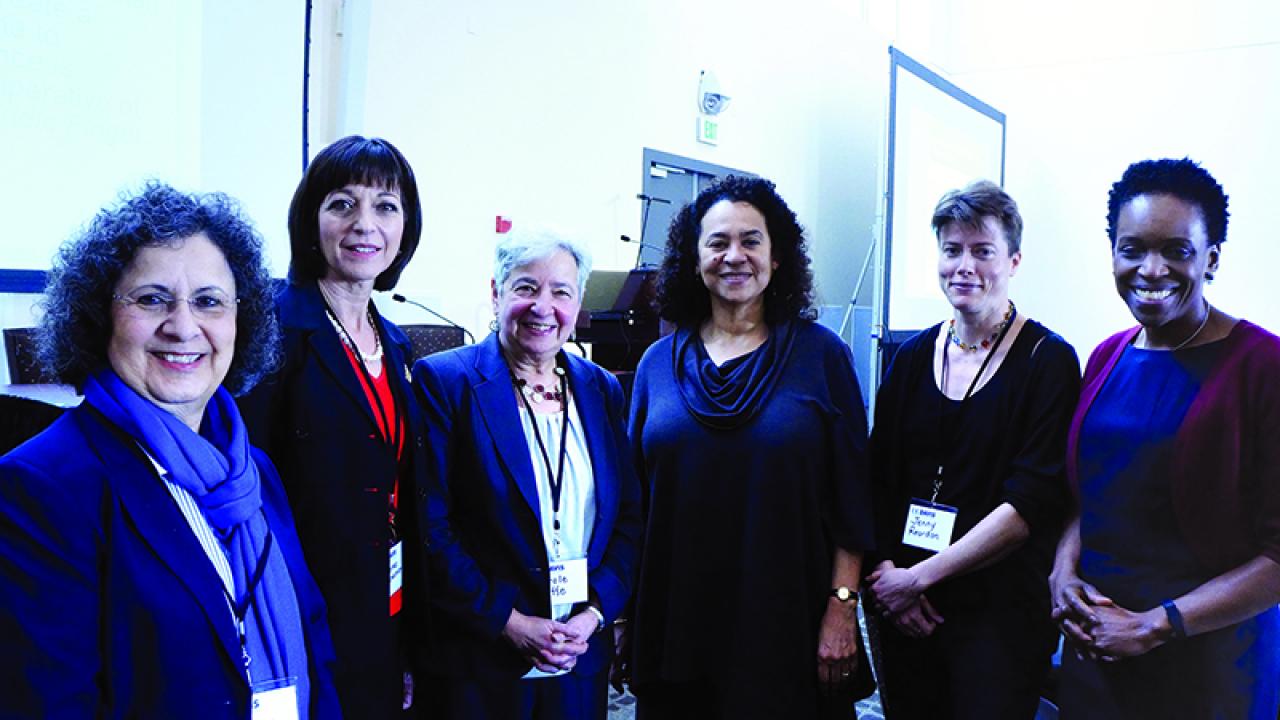
Breaking Free: New Feminist Research Institute Looks Toward Future
Many of the most productive and influential scholars at UC Davis are women. This is no accident. UC Davis has made a concerted effort to support female academics’ career trajectories, particularly in science, technology, engineering and mathematics (STEM)—fields where UC Davis is setting new standards for women.
But more progress is on the horizon, not only to advance women’s research endeavors, but also to generate more equitable knowledge for all. This year, the campus launched a Feminist Research Institute (FRI) to examine how sex, gender, race and other social structures shape the production of scientific knowledge.
Amina Mama, a professor in Gender, Sexuality and Women’s Studies and planning director of FRI (pronounced “free”), said the institute will have far-reaching impact by fostering research collaborations across the basic sciences, social sciences, humanities, health sciences, engineering, law, economics, agricultural sciences and environmental sciences.
Mama described FRI as transformative and socially engaged. “It has an ethic of change, of making things better.”
Rethinking boundaries
In February more than 140 people attended the institute’s inaugural conference, “Rethinking the Boundaries of Sex and Gender in Science, Society and Technology.” The daylong conference featured talks on feminist research in reproductive health and genomics, as well as breakout sessions for brainstorming ideas for research collaborations.
Carole Joffee, a UC Davis sociology professor emerita now on the faculty at UC San Francisco’s Bixby Center for Reproductive Rights, was one of the conference speakers:
“UC Davis is the perfect place to bring together natural scientists, social scientists and humanists to engage in collective feminist research. I am thrilled for you, and, as a professor emerita, I am thrilled for me.”
Suad Joseph, a distinguished professor in the Department of Anthropology and the Gender, Sexuality, and Women’s Studies and Middle East/South Asia Studies programs, chaired the committee that developed the proposal to create FRI.
“Many of us live at the academy inside social structures—departmental structures and disciplinary frames—that really were inherited from the 19th century, and yet we are trying to address 21st century issues,” Joseph told conference participants.
“We thought that we needed an institute that was forward looking and yet recognized our debt to our past and our history.”
That history includes two other campus efforts to advance women scholars at UC Davis:
- The Consortium for Women and Research, which sponsored research and travel awards, talks and professional development for women on campus for two decades.
- The ADVANCE project, launched by Chancellor Linda P.B. Katehi in fall 2012 with funding from the National Science Foundation to increase participation by women, especially Latinas, in the STEM careers.
Advancing women in STEM
Hispanic women make up only 1 percent of the U.S. science and engineering work force. Through an ADVANCE initiative called CAMPOS (Center for Advancing Multicultural Perspectives on Science), UC Davis has recruited 12 Latina scientists to the faculty over the last two years.
Of the 1,545 ladder-rank faculty members across campus, 542, or 35 percent, are female, and that ratio is increasing. Nearly 45 percent of the ladder faculty hires over the past five years have been female.
FRI has 140 affiliates and also draws on the strengths of over 100 scholars affiliated with a fast-growing graduate studies designated emphasis in feminist theory and research.
Provost and Executive Vice Chancellor Ralph Hexter said FRI’s mission is critical to the university’s “great enterprise to create the world we want and deserve, one that treats us all equitably, fairly and inclusively, and supports our health, well-being and happiness.”
— Kathleen Holder, content strategist in the UC Davis College of Letters and Science
